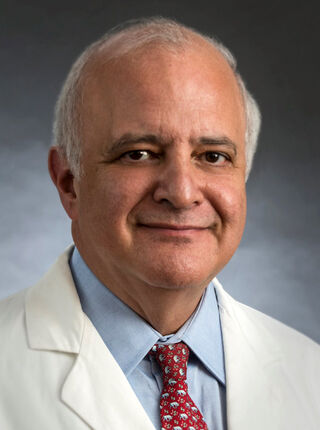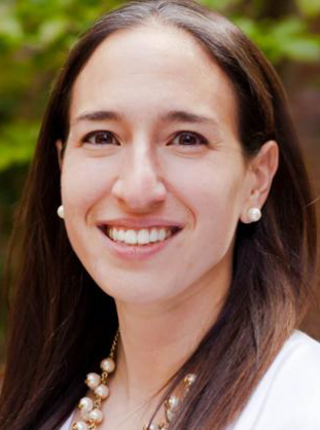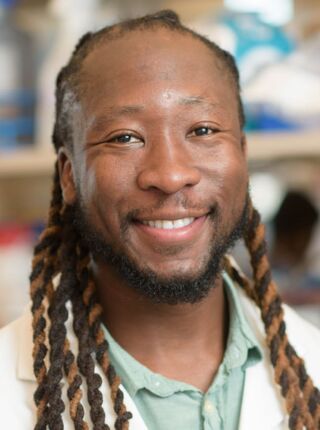- Home
- Announcements
- University Presidential Professorships held by PSOM faculty
University Presidential Professorships held by PSOM faculty
Nduka M. Amankulor, MD

Presidential Associate Professor of Neurosurgery
Nduka.Amankulor@Pennmedicine.upenn.edu
800-789-7366
RESEARCH
In addition to his clinical practice focused on the surgical treatment of complex brain and spine tumors, Dr. Amankulor is a cancer biologist and immunologist engaged in developing new therapeutic strategies for primary (diffuse gliomas and GBM) and metastatic brain tumors.
Donita C. Brady, PhD

Harrison McCrea Dickson, MD & Clifford C. Baker, MD Presidential Associate Professor of Cancer Biology
bradyd@pennmedicine.upenn.edu
215-573-9705
RESEARCH
Dr. Brady's research program is founded in a new paradigm in nutrient sensing and protein regulation, termed metalloallostery, where redox-active metals control kinase activity, and is advancing our knowledge in basic science and disease-focused areas. Her focus lies at the intersection of kinase signaling and copper (Cu) homeostasis with the goal of defining the mechanistic features of Cu-dependent kinases to target them in cancer via drug repurposing or development.
Natalí L. Chanaday Ricagni, PhD

Presidential Assistant Professor of Physiology
Natali.Chanaday@Pennmedicine.upenn.edu
215-898-8725
RESEARCH
Dr. Chanaday uses molecular and pharmacological tools combined with live fluorescence imaging (microscopy) and electrophysiology of cultured neurons to investigate how neurotransmitter release is modulated and how synaptic vesicles are recycled. She is particularly interested in trafficking mechanisms of synaptic vesicle molecules and atypical calcium sources that have the potential to set basal neuron properties and shape the type of information neurons can transfer, as well as investigating novel forms of neuronal communication.
Sharlene M. Day, MD

Presidential Associate Professor of Medicine
sharlene.day@pennmedicine.upenn.edu
215-573-4717
RESEARCH
Dr. Day's research focuses on hypertrophic cardiomyopathy (HCM), the most common genetic cardiovascular disease of Mendelian inheritance, and integrates basic, translational and clinical science. She has a strong interest in learning how genetic and non-genetic factors (particularly exercise) influence the cardiovascular phenotype and clinical outcomes in patients.
César de la Fuente, PhD

Presidential Assistant Professor of Psychiatry
cfuente@pennmedicine.upenn.edu
215-746-6083
RESEARCH
Dr. de la Fuente's research combines the power of machines and biology to study, detect, and treat infectious diseases. Current application areas include developing novel approaches for antibiotic discovery, building tools for microbiome engineering, and creating low-cost diagnostics.
Ramon R. Diaz-Arrastia, MD, PhD

John McCrea Dickson, MD Presidential Professor of Neurology
Ramon.Diaz-Arrastia@uphs.upenn.edu
215-662-9732
RESEARCH
Dr. Diaz-Arrastia's research focuses on understanding the molecular and cellular mechanisms of neuronal injury and neuroregeneration, with the goal of developing novel diagnostic and therapeutic strategies. He studies the effects of traumatic brain injury (TBI) and combines imaging, genomic, and tissue biomarkers to develop more targeted, personalized therapies.
Roberto Dominguez, PhD

William Maul Measey Presidential Professor in Physiology II
droberto@pennmedicine.upenn.ed
215-573-4559
RESEARCH
The main focus of Dr. Dominguez's research is to understand the molecular basis for how protein-protein interaction networks bring together cytoskeleton scaffolding, nucleation, elongation, and signaling proteins to accomplish specific cellular functions. He uses protein X-ray crystallography to create atomic “snapshots” resulting from the X-ray crystal structures of proteins and a host of other approaches, including mutagenesis, bio-informatics, biophysical and biochemical methods, to understand dynamic aspects of protein-protein interactions.
Oluwadamilola "Lola" Fayanju, MD, MA, MPHS

Helen O. Dickens, M.D. Presidential Associate Professor of Surgery
Oluwadamilola.Fayanju@Pennmedicine.upenn.edu
215-662-4392
RESEARCH
Dr. Fayanju's research focuses on health disparities, aggressive breast cancer variants, and improving value in oncology, particularly through the collection and application of patient-reported outcomes (PROs).
Kellie Ann Jurado, PhD

Presidential Assistant Professor of Microbiology
kellie.jurado@pennmedicine.upenn.edu
215-573-6378
RESEARCH
Dr. Jurado's research focuses on delineating disease pathogenesis of emerging viruses in order to uncover mechanisms of immune control. She primarily focuses on emerging viral pathogens that present with unknown mechanisms of disease in the nervous system or placenta.
Damaris Lorenzo, PhD

Presidential Associate Professor of Cell and Developmental Biology
Damaris.Lorenzo@Pennmedicine.upenn.edu
651-283-0368
RESEARCH
Dr. Lorenzo uses mouse genetics, live cell imaging, and a wide range of molecular biology and biochemical approaches to understand the roles of cytoskeletal proteins in cellular homeostasis and in human disease. Another major interest of her lab is to elucidate the molecular mechanisms through which cytoskeleton-associated proteins regulate cellular dynamics and bioenergetics in metabolically active tissues, and how their deficits contribute to obesity, diabetes, and metabolic syndrome.
Tim Machado, PhD

Presidential Assistant Professor of Neuroscience
Timothy.Machado@Pennmedicine.upenn.edu
(215) 573-8815
RESEARCH
Dr. Machado studies how the neural circuits controlling movement combine sensory information, memories of past experiences, and internal state to generate plans for specific actions.
Kahlilia Morris-Blanco, PhD

Presidential Assistant Professor of Cell and Developmental Biology
kahlilia.blanco@pennmedicine.upenn.edu
215-898-8140
RESEARCH
Dr. Blanco investigates the role of epigenetics in stroke pathophysiology, with particular interest in how epigenetic mechanisms regulate mitochondrial properties and brain damage after stroke. Using experimental models of stroke, she examines the role of DNA modifications as well as epigenomic readers, writers, and erasers in the post-stroke brain with cutting-edge tools. Dr. Blanco's research merges neuroscience, genomics, and biochemistry with neurological applications.
Richard Phillips, MD, PhD

Presidential Assistant Professor of Neurology
richard.phillips@pennmedicine.upenn.edu
617-838-7740
RESEARCH
Dr. Phillips' research combines chromatin biology, neuroscience and cancer biology to understand how epigenetic mechanisms drive the development of brain cancer. Drawing from his focused investigations into epigenetic regulation, in addition to more unbiased approaches, his goal is to identify novel therapies for patients with brain cancer.
Christina Roberto, PhD

Mitchell J. Blutt & Margo Krody Blutt Presidential Associate Professor of Health Policy
croberto@pennmedicine.upenn.edu
215-746-7064
RESEARCH
Dr. Roberto's research aims to identify and understand factors that promote unhealthy eating behaviors linked to obesity and eating disorders and design interventions to promote healthy eating. In her work, she draws upon the fields of psychology, marketing, behavioral economics, epidemiology, and public health to answer research questions that can provide policymakers and institutions with science-based guidance.
Cornelius Y. Taabazuing, PhD

Presidential Assistant Professor of Biochemistry & Biophysics
cornelius.taabazuing@pennmedicine.upenn.edu
617-755-4838
RESEARCH
Dr. Taabazuing's research combines biochemistry and cell biology approaches to study the molecular regulation of cell death. Specifically, he is interested in pyroptotic and apoptotic cell death. His goal is to understand how cell death impacts the immune system and to leverage that to develop therapeutics for human diseases.
J. Deanna Wilson, MD, MPH

Presidential Assistant Professor of Family Medicine and Community Health
jacqueline.wilson1@pennmedicine.upenn.edu
RESEARCH
Dr. Wilson's research interests include reducing substance use-related health disparities, with an emphasis on innovative strategies to treat opioid use disorders in adolescent and adult populations. Her work includes integrating harm reduction into primary care settings, developing low threshold models of care to improve engagement and retention of vulnerable populations, and improving engagement and retention of adolescents and young adults in OUD treatment.

